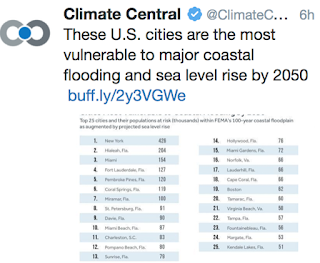How Well Have Past "Climate Catastrophe" Reports Aged?
Friday, Dr. Roger Pielke, Jr. and I took a look at the latest in a seemingly never-ending series of reports calling for climate catastrophes. In it, I stated,
I tend to focus on what is occurring now and compare it to past IPCC/US Climate Project projections. Obviously, the current climate in the United States is not as bad as was forecast.
Let's take a look (hat tip: Dr. Ross McKittrick) at how well one of these comprehensive reports, thirteen years ago, has aged in the past 13 years:
So, when you see advocacy organizations that purport to be able to forecast the effects of global warming 33 years into the future (example below),
I wouldn't worry too much. Think about how poorly the "nuclear war" report (above) has worked out.
Of course, 2020 has not arrived. But there is no chance of global warming causing the laundry list of catastrophes in the next two years and two months. That is more than sufficient reason to chill out when these are reported in the media.
I tend to focus on what is occurring now and compare it to past IPCC/US Climate Project projections. Obviously, the current climate in the United States is not as bad as was forecast.
Let's take a look (hat tip: Dr. Ross McKittrick) at how well one of these comprehensive reports, thirteen years ago, has aged in the past 13 years:
...Major European cities will be sunk beneath rising seas as Britain is plunged into a 'Siberian' climate by 2020. Nuclear conflict, mega-droughts, famine and widespread rioting will erupt across the world.
The document predicts that abrupt climate change could bring the planet to the edge of anarchy as countries develop a nuclear threat to defend and secure dwindling food, water and energy supplies. The threat to global stability vastly eclipses that of terrorism, say the few experts privy to its contents.
'Disruption and conflict will be endemic features of life,' concludes the Pentagon analysis. 'Once again, warfare would define human life.' ...
Already [2004], according to Randall and Schwartz, the planet is carrying a higher population than it can sustain. By 2020 'catastrophic' shortages of water and energy supply will become increasingly harder to overcome, plunging the planet into war. They warn that 8,200 years ago climatic conditions brought widespread crop failure, famine, disease and mass migration of populations that could soon be repeated.
Randall told The Observer that the potential ramifications of rapid climate change would create global chaos. 'This is depressing stuff,' he said. 'It is a national security threat that is unique because there is no enemy to point your guns at and we have no control over the threat.'
Randall added that it was already possibly too late to prevent a disaster happening. 'We don't know exactly where we are in the process. It could start tomorrow and we would not know for another five years,' he said.
'The consequences for some nations of the climate change are unbelievable. It seems obvious that cutting the use of fossil fuels would be worthwhile.'
So dramatic are the report's scenarios, Watson said, that they may prove vital in the US elections. Democratic frontrunner John Kerry is known to accept climate change as a real problem. Scientists disillusioned with Bush's stance are threatening to make sure Kerry uses the Pentagon report in his campaign.
The entire story is here.
So, when you see advocacy organizations that purport to be able to forecast the effects of global warming 33 years into the future (example below),
I wouldn't worry too much. Think about how poorly the "nuclear war" report (above) has worked out.
Of course, 2020 has not arrived. But there is no chance of global warming causing the laundry list of catastrophes in the next two years and two months. That is more than sufficient reason to chill out when these are reported in the media.





Comments
Post a Comment